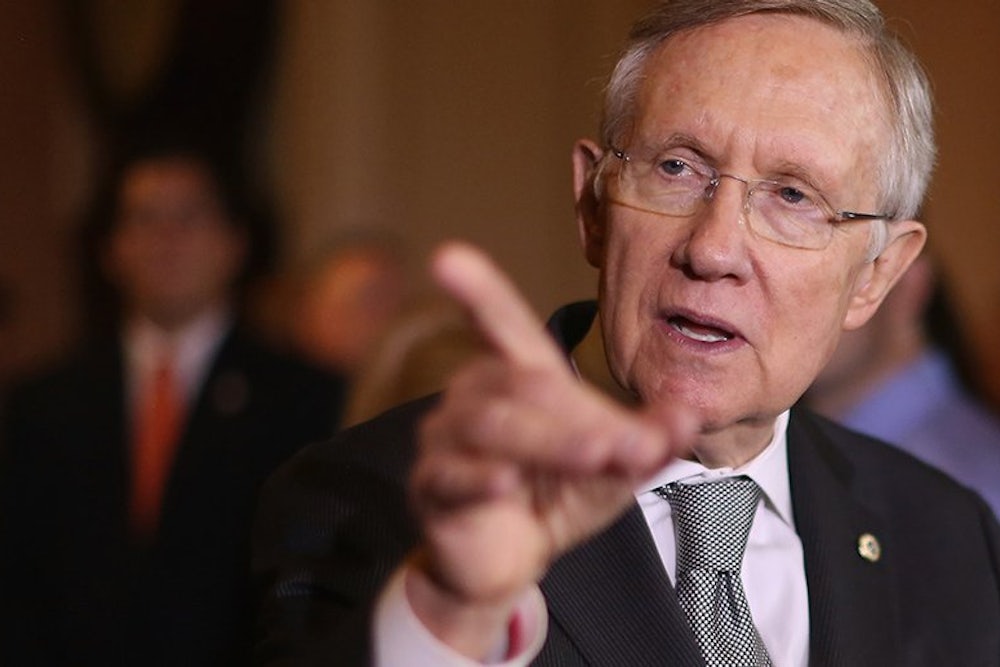The late, great British Prime Minister Winston Churchill once advised that if you’re going through hell, “keep going.”
In many ways, this has been the guiding principle of retiring Senate Minority Leader Harry Reid’s long and oftentimes tempestuous political career.
Ever since arriving in Congress in 1982, the 75-year-old Nevada Democrat has not been afraid to engage in the bare knuckle partisanship that has characterized Washington, D.C., politics in recent decades.
“He’s got that curmudgeonly charm that is hard to replace,” confirmed President Barack Obama upon Reid’s surprise announcement on March 27 that he intended not to run for re-election.
Fierce opponent to Republicans on health care reform
Indeed, to Republicans who opposed Obama’s signature Affordable Care Act of 2010, Reid went out of his way to compare them to earlier obstructionists of groundbreaking civil rights legislation in the 1950s and 1960s. “Instead of joining us on the right side of history,” he thundered, “all the Republicans can come up with is, ‘slow down, stop everything, let’s start over.’ If you think you’ve heard these excuses before, you’re right.”
He had even harsher things to say about former President George W. Bush, whom he once likened to “a loser.” He was a vocal and persistent critic of Bush’s Iraq War policies, which he claimed were ineffectual and leading to an inevitable American military defeat in the Middle East. “This war is lost,” he said.
Needless to say, this kind of rhetoric did not go over well with pro-war supporters like John McCain, his Republican Senate colleague from Arizona. “It seems to me Senator Reid has lost all sense of priority,” McCain said.
Reid was no Lyndon Johnson
Alas, Reid will never be confused with Lyndon Johnson, the great Democratic Senate majority leader of the 1950s. The tall and physically imposing Texan employed what became known as “The Treatment,” an intoxicating mixture of guile, stubborn persistence, country charm, and sheer physical force that psychologically bent would-be political opponents to his will. “Its velocity was breathtaking, and it was all in one direction,” noted the journalists Rowland Evans and Robert Novak. Johnson:
moved in close, his face a scant millimeter from its target, his eyes widening and narrowing, his eyebrows rising and falling. From his pockets poured clippings, memos, statistics. Mimicry, humor and the genius of analogy made The Treatment an almost hypnotic experience and rendered the target stunned and helpless.
Reid lacked such deft Machiavellian gifts, but he has had his moments. During his tenure as Majority Leader, he helped push through comprehensive Wall Street financial reform with the Dodd-Frank Act of 2010, which placed greater accountability and federal regulatory oversight on our nation’s biggest financial institutions. He also ensured the passage of an $800 billion economic stimulus bill that Obama lobbied for in the early days of his administration to offset the worst effects of the 2008 financial panic. “I know how to dance, I know how to fight,” the former amateur boxer once said. He seemed to do more of the latter on Capitol Hill, however.
Through it all, he has earned the grudging respect, if not qualified admiration, of his worst political enemies. “The GOP could learn a lot from him,” writes Erik Erickson of FoxNews.com. “The Republicans try to get through a week without blowing themselves up. Reid tries to shape an entire year to make sure the GOP is blown up a month before election day.”
Who will succeed Reid?
With Reid’s departure, the $60,000 Washington beltway question of the day is who will succeed him. His stated preferred choice, the more restrained and politic Senator Chuck Schumer of New York, seems to have the inside track. But regardless of who eventually does replace him as leader of the Senate Democratic caucus, Reid mischievously reminded Republicans that he will not be leaving the Senate until his term is officially over in 2016: “I am going to be here for 22 months. I am going to be doing the same thing I have done since I first came to the Senate.”
If I was Mitch McConnell, Reid’s long-suffering counterpart on the GOP side of the aisle, I’d start worrying.
This article was originally published on The Conversation. Read the original article.
